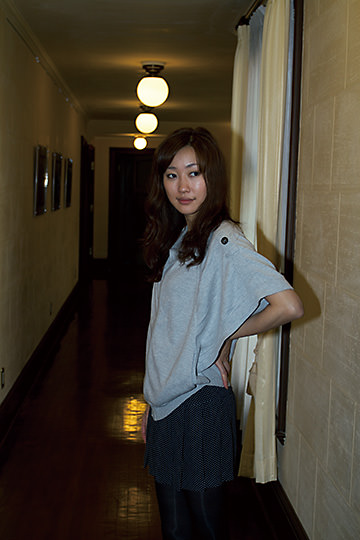While in the Program AE mode, in some cases, the background in the photo may turn out dark even when the flash is enabled. This often occurs when the subject is standing at a distance away from the background. In this article, I will introduce techniques that help to resolve this problem easily. (Reported by: Yasuhiko Kani, Model: Sayuri Kurahashi (IARA))

Exposure compensation does not work in the Program AE mode?
Many SLR camera users probably have the experience of firing the flash at a restaurant or indoor tourist spot, but realising later that the photo looked like a "commemorative shot that was obviously taken with a flash", and was unable to convey the atmosphere of the place as intended.
The reason for this is because when the flash is enabled in the Program AE mode, the lower shutter speed limit would be set automatically to about 1/60 second and the aperture setting to a value close to f/4 to f/5.6 even when you are photographing at a dimly-lit location. Not only so, if the maximum aperture value of the lens in use is dark, exposure compensation would not work effectively. Even if exposure compensation works with the use of a bright lens, this would cause considerable changes to the depth of field.
To prevent this problem from arising, simply select a high ISO speed. Doing so will allow the background to look clear and bright even in the Program AE mode. Although the subject will be affected more significantly by natural light as a result, the TTL flash comes in handy in this case by adjusting the flash output to the appropriate state with the brightness of natural light taken into account.
Issues Concerning Camera Flash
Background turns out dark in the Program AE mode

- The glaring flash light that falls on the face of the subject leaves an impression that the photo was obviously taken with a flash.
- A strong shadow is cast on the background, making the presence of the flash light more obvious to the viewer.
- The background is dark and unclear. It would be more desirable if the surroundings are more clearly visible.
EOS 7D/ EF17-40mm f/4L USM/ FL:35mm/ Program AE (1/60 sec., f/4)/ ISO 200/ WB: Auto
A handheld shot taken on a long, dark corridor. The IS feature in the Program AE mode prevents the shutter speed from falling below 1/60 second, causing the background that is at a distance from the flash to turn out dark due to insufficient flash output.
Raising the ISO speed solves the problem!

Shooting Conditions
Flash: Speedlite 580 EX II
Camera Body: EOS 7D
Lens: EF17-40mm f/4L USM
Metering Mode: Evaluative
Shooting Mode: Program AE
Program AE (1/60 sec., f/4)/ ISO 1600/ WB: Auto
If you want to bring out the atmosphere of a dimly-lit location while photographing in the Program AE mode, simply raise the ISO speed. You can easily tell from the hair and clothes of the subject that not only is the background brightened, the image looks more natural when the soft lighting is mixed with the cold impression of the flash light.
Why does the colour of the background change?
The reason that the background colour appears different is not because its colour has changed. Rather, the weak light that is originally present at the location, which includes the yellow light of the bulbs and the natural light penetrating through the cream-coloured curtains, now becomes visible with a high ISO speed setting. You can alter how a photo looks considerably by adjusting the balance between the flash light and natural light.


Born in 1970 and graduated from Nihon University, Kani studied under photographer Shin Yamagishi before he went independent. He currently focuses on portrait photography, and is also engaged in a wide variety of activities for magazines, photo albums, CD jackets, advertisements, and movies.

A monthly magazine that believes that enjoyment of photography will increase the more one learns about camera functions. It delivers news on the latest cameras and features and regularly introduces various photography techniques.
Published by Impress Corporation

































